The SSD Relapse: Understanding and Choosing the Best SSD
by Anand Lal Shimpi on August 30, 2009 12:00 AM EST- Posted in
- Storage
Overall System Performance using PCMark Vantage
Next up is PCMark Vantage, another system-wide performance suite. For those of you who aren’t familiar with PCMark Vantage, it ends up being the most real-world-like hard drive test I can come up with. It runs things like application launches, file searches, web browsing, contacts searching, video playback, photo editing and other completely mundane but real-world tasks. I’ve described the benchmark in great detail before but if you’d like to read up on what it does in particular, take a look at Futuremark’s whitepaper on the benchmark; it’s not perfect, but it’s good enough to be a member of a comprehensive storage benchmark suite. Any performance impacts here would most likely be reflected in the real world.
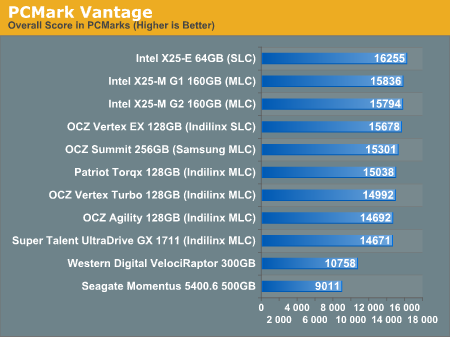
The overall PCMark Vantage score takes into account CPU and GPU performance and thus storage performance is only one aspect of determining your score. All of the SSDs do well here, the slowest configuration still around 36% faster than the WD VelociRaptor; something I'd say is more than reflected in real world performance.
The memories suite includes a test involving importing pictures into Windows Photo Gallery and editing them, a fairly benign task that easily falls into the category of being very influenced by disk performance.
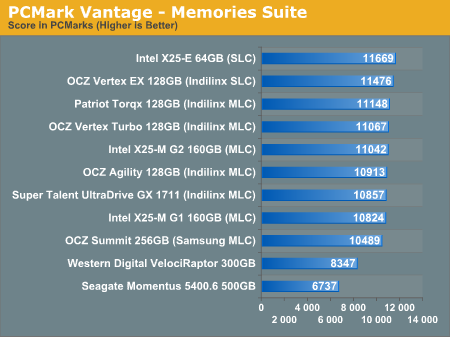
Once again the SSDs all perform very similarly here. The fastest of the group is Intel's X25-E, but the Indilinx drives actually hold the next three spots followed by the new G2. The performance range is very small between these drives though, you honestly can't go wrong with either an Indilinx MLC or X25-M.
The TV and Movies tests focus on on video transcoding which is mostly CPU bound, but one of the tests involves Windows Media Center which tends to be disk bound.
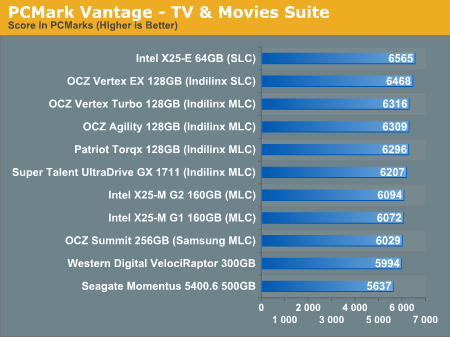
The standings continue to be roughly the same. We see just how much more competitive Indilinx is this time around than when the OCZ Vertex first hit the streets. We do have a real alternative to Intel.
The gaming tests are very well suited to SSDs since they spend a good portion of their time focusing on reading textures and loading level data. All of the SSDs dominate here, but as you'll see later on in my gaming tests the benefits of an SSD really vary depending on the game. Take these results as a best case scenario of what can happen, not the norm.
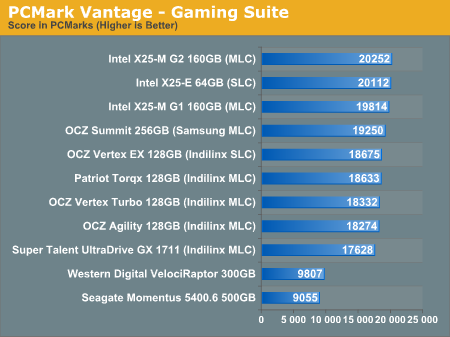
The Vantage Gaming Suite shows us our first example of the X25-M G2 pulling ahead of even the SLC X25-E. Even the Samsung based OCZ Summit does very well here.
In the Music suite the main test is a multitasking scenario: the test simulates surfing the web in IE7, transcoding an audio file and adding music to Windows Media Player (the most disk intensive portion of the test).
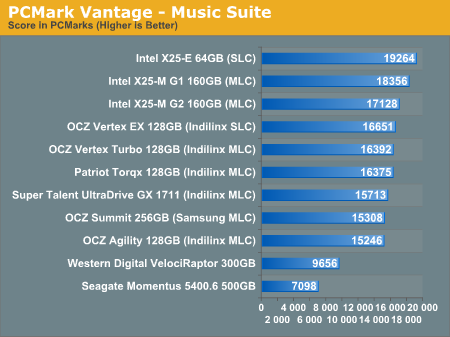
The Intel drives are at the top, the G1 faster than the G2, followed by the Indilinx drives, then the Samsung drive and the mechanical drives. New performance is important here because once TRIM shows up, this is closer to what you'll be seeing for a drive with a good amount of free space.
The Communications suite is made up of two tests, both involving light multitasking. The first test simulates data encryption/decryption while running message rules in Windows Mail. The second test simulates web surfing (including opening/closing tabs) in IE7, data decryption and running Windows Defender.
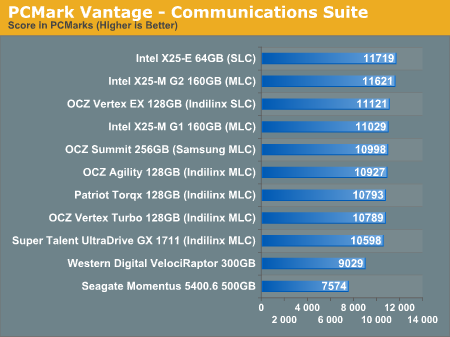
I love PCMark's Productivity test; in this test there are four tasks going on at once, searching through Windows contacts, searching through Windows Mail, browsing multiple webpages in IE7 and loading applications. This is as real world of a scenario as you get and it happens to be representative of one of the most frustrating HDD usage models - trying to do multiple things at once. There's nothing more annoying than trying to launch a simple application while you're doing other things in the background and have the load take seemingly forever.
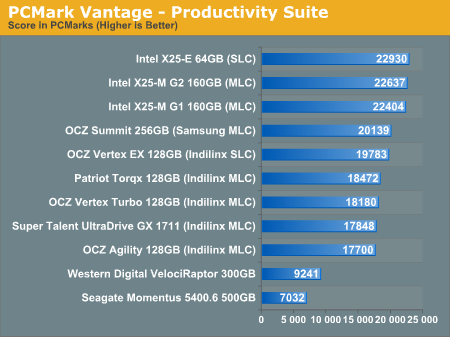
Here the Intel drives are at the top, by a noticeable margin. The G1, G2 and X25-E are all around the same level of performance. Samsung comes close with the OCZ Summit and the Indilinx drives pull up the rear. You can't go wrong with either the Intel or Indilinx drives but Intel is clearly faster here.
The final PCMark Vantage suite is HDD specific and this is where you'll see the biggest differences between the drives:
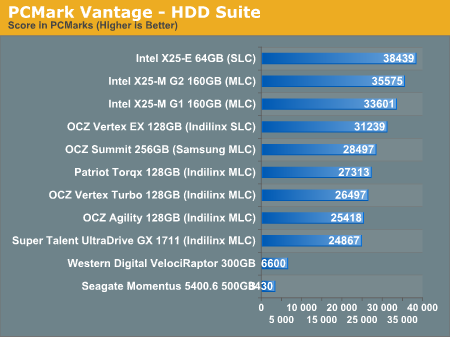
When it comes to pure drive performance, the breakdown doesn't get any simpler. Intel's X25-E holds the top spot, followed by the G2 and G1. While the G2 is only 5.6% faster than the G1, remember that we're looking at "new" performance here. Over time, with TRIM, the G2 will be closer to this performance, while the G1 will never get here again.
Despite poor random small file write performance, the OCZ Summit actually does very well here.
All of the drives perform incredibly compared to any mechanical hard drives.










295 Comments
View All Comments
sunbear - Monday, August 31, 2009 - link
Even though most laptops are now SATA-300 compatible, the majority are not able to actually exceed SATA-150 transfer speeds according to some people who have tried. I would imagine that sequential read/write performance would be important for swap but the SATA-150 will be the limiting factor for any of the SSD's mentioned in Anand's article in this case.Here's the situation with Thinkpads:
http://blogs.technet.com/keithcombs/archive/2008/1...">http://blogs.technet.com/keithcombs/arc...vo-think...
The new MacBookPro is also limited to SATA-150.
smartins - Tuesday, September 1, 2009 - link
Actually, The ThinkPad T500/T400/W500 are fully SATA-300 compatible, it's only the drives that ship with the machines that are SATA-150 capped.I have a Corsair P64 on my T500 and get an average of 180MB/read which is consistent with all the reviews of this drive.
mczak - Monday, August 31, 2009 - link
article says you shouldn't expect it soon, but I don't think so. Several dealers already list it, though not exactly in stock (http://ht4u.net/preisvergleich/a444071.html)">http://ht4u.net/preisvergleich/a444071.html). Price tag, to say it nicely, is a bit steep though.Seramics - Monday, August 31, 2009 - link
Another great articles from Anandtech. Kudos guys at AT, ur my no. 1 hardware site! Anyway, its really great that we have a really viable competitor to Intel- Indilinx. They really deserve the praise. Now we can buy a non Intel SSD and have no nonsensical stuttering issue! Overall, Intel is still leader but its completely nonsensical how bad their sequential write speed is! I mean, its even slower than a mechanical hard disk! Thats juz not acceptable given the gap in performance is so large and Intel SSD's actually can suffer a significantly worst performance in real world when sequential write speed performance matters. Intel, fix your seq write speed nonsence please!Seramics - Monday, August 31, 2009 - link
Sorry for double post. Its unintentional and i duno how to delete the 2nd post.Seramics - Monday, August 31, 2009 - link
Another great articles from Anandtech. Kudos guys at AT, ur my no. 1 hardware site! Anyway, its really great that we have a really viable competitor to Intel- Indilinx. They really deserve the praise. Now we can buy a non Intel SSD and have no nonsensical stuttering issue! Overall, Intel is still leader but its completely nonsensical how bad their sequential write speed is! I mean, its even slower than a mechanical hard disk! Thats juz not acceptable given the gap in performance is so large and Intel SSD's actually can suffer a significantly worst performance in real world when sequential write speed performance matters. Intel, fix your seq write speed nonsence please!Shadowmaster625 - Monday, August 31, 2009 - link
Subtle. Very subtle. Good article though.3 questions:
1. Is there any way to read the individual page history off the SSD device so I can construct a WinDirStat style graphical representation of the remaining expected life of the flash? Or better yet is there already a program that does this?
2. Suppose I had a 2 gigabyte movie file on my 60gb vertex drive. And suppose I had 40GB of free space. If I were to make 20 copies of that movie file, then delete them all, would that be the same as running Wiper?
3. Any guesses as to which of these drives will perform best when we make the move to SATA-III?
4. (Bonus) What is stopping Intel from buying Indilinx (and pulling their plug)? (Or just pulling their plug without buying them...)
SRSpod - Thursday, September 3, 2009 - link
3. These drives will perform just as they do now when connected to a 6 GBps SATA controller. In order to communicate at the higher speed, both the drive and the controller need to support it. So you'll need new 6 GBps drives to connect to your 6 GBps controller before you'll see any benefit from the new interface.heulenwolf - Monday, August 31, 2009 - link
Yeah, once the technology matures a little more and drives become more commoditized, I'd like to see more features in terms of feedback on drive life, reliability, etc. When I got my refurb Samsung drives from Dell, for example, they could have been on the verge of dying or they could have been almost new. There's no telling. The controller could know exactly where the drive stands, however. Some kind of controller-tracked indication of drive life left would be a feature that might distinguish comparable drives from one another in a crowded marketplace.While they're at it, a tool to allow adjusting of values such as the amount of space not reported to the OS with output in terms of write amplification and predicted drive life would be really nifty.
Sure, its over the top, but we can always hope.
nemitech - Monday, August 31, 2009 - link
I picked up an Agility 120 Gb for $234 last week from ebay ($270 list price - - 6% bing cashback - $20 pay pal discount). I am sure there will be similar deals around black Friday. $2 per Gb is possible for a good SSD.